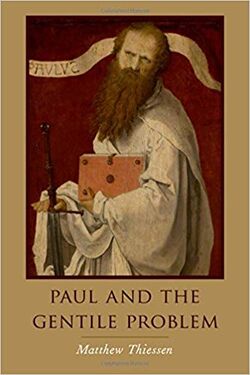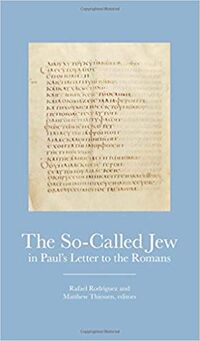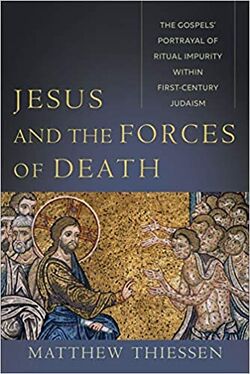Matthew Thiessen
Jump to navigation
Jump to search
Matthew Thiessen is a scholar at McMaster University, Canada.
-- 2010s --
Matthew Thiessen, Paul and the Gentile Problem (2016 Thiessen), book (New York, NY: Oxford University Press, 2016)
- "Paul and the Gentile Problem provides a new explanation for the apostle Paul's statements about the Jewish law in his letters to the Romans and Galatians. Paul's arguments against circumcision and the law in Romans 2 and his reading of Genesis 15-21 in Galatians 4:21-31 belong within a stream of Jewish thinking which rejected the possibility that gentiles could undergo circumcision and adopt the Jewish law, thereby becoming Jews. Paul opposes this solution to the gentile problem because he thinks it misunderstands how essentially hopeless the gentile situation remains outside of Christ. The second part of the book moves from Paul's arguments against a gospel that requires gentiles to undergo circumcision and adoption of the Jewish law to his own positive account, based on his reading of the Abraham Narrative, of the way in which Israel's God relates to gentiles. Having received the Spirit (pneuma) of Christ, gentiles are incorporated into Christ, who is the singular seed of Abraham, and, therefore, become materially related to Abraham. But this solution raises a question: Why is it so important for Paul that gentiles become seed of Abraham? The argument of this book is that Paul believes that God had made certain promises to Abraham that only those who are his seed could enjoy and that these promises can be summarized as being empowered to live a moral life, inheriting the cosmos, and having the hope of an indestructible life."--Publisher description.
- Contents : Part 1. Jewish universalism and the gentile problem. Jewish solutions to the gentile problem -- The gentile identity of the "so-called" Jew in Romans -- "Do you not hear the law?" -- Part 2. Abraham's seed and the gentile solution. Gentile sons and seed of Abraham -- Abraham, the promised pneuma, and the gentile solution.
Edited volume -- Rafael Rodríguez / Matthew Thiessen (eds.), The So-Called Jew in Paul's Letter to the Romans (Minneapolis, MN : Fortress Press, 2016)
- "Nine Pauline scholars focus their attention on the rhetoric of diatribe and characterization in the opening chapters of the letter, asking what Paul means by the "so-called Jew" in Romans 2 and where else in the letter's argumentation that figure appears or is implied ... Decades ago, Werner G. Kummel described the historical problem of Romans as its "double character": concerned with issues of Torah and the destiny of Israel, the letter is explicitly addressed not to Jews but to Gentiles. At stake in the numerous answers given to that question is nothing less than the purpose of Paul's most important letter. In The So-Called Jew in Romans, nine Pauline scholars focus their attention on the rhetoric of diatribe and characterization in the opening chapters of the letter, asking what Paul means by the "so-called Jew" in Romans 2 and where else in the letter's argumentation that figure appears or is implied. Each component of Paul's argument is closely examined with particular attention to the theological problems that arise in each. In addition to the editors, contributors are Runar M. Thorsteinsson, Magnus Zetterholm, Joshua D. Garroway, Matthew V. Novenson, and Michele Murraywith a response by Joshua W. Jipp."--Publisher description.
- Contents -- Paul's interlocutor in Romans: the problem of identification / Runar M. Thorsteinsson, Matthew Thiessen, and Rafael Rodríguez -- The non-Jewish interlocutor in Romans 2:17 and the salvation of the nations: contextualizing Romans 1:18-32 / Magnus Zetterholm -- Paul's so-called Jew and lawless lawkeeping / Matthew Thiessen -- Paul's gentile interlocutor in Romans 3:1-20 / Joshua D. Garroway -- Romans 5-8 in light of Paul's dialogue with a gentile who "calls himself a Jew" / Rafael Rodríguez -- The self-styled Jew of Romans 2 and the actual Jews of Romans 9-11 / Matthew V. Novenson -- Romans 2 within the broader context of gentile Judaizing in early Christianity / Michele Murray -- What are the implications of the ethnic identity of Paul's interlocutor?: continuing the conversation / Joshua W. Jipp.
-- 2020s --
Matthew Thiessen, Jesus and the Forces of Death: The Gospels' Portrayal of Ritual Impurity within First-Century Judaism (Grand Rapids, MI: Baker Academic, 2020)
- “Although most people acknowledge that Jesus was a first-century Jew, interpreters of the Gospels often present him as opposed to Jewish law and customs--especially when considering his numerous encounters with the ritually impure. Matthew Thiessen corrects this popular misconception by placing Jesus within the Judaism of his day. Thiessen demonstrates that the Gospel writers depict Jesus opposing ritual impurity itself, not the Jewish ritual purity system or the Jewish law. This fresh interpretation of significant passages from the Gospels shows that throughout his life, Jesus destroys forces of death and impurity while upholding the Jewish law."--Publisher description.


